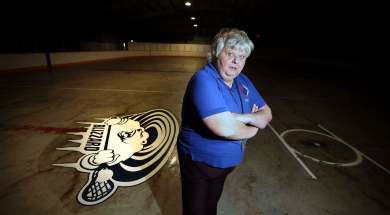Report outlining Hydro’s impact on Northern Manitoba includes allegations of historic sexual assault
Read this article for free:
or
Already have an account? Log in here »
To continue reading, please subscribe:
Monthly Digital Subscription
$0 for the first 4 weeks*
- Enjoy unlimited reading on winnipegfreepress.com
- Read the E-Edition, our digital replica newspaper
- Access News Break, our award-winning app
- Play interactive puzzles
*No charge for 4 weeks then price increases to the regular rate of $19.00 plus GST every four weeks. Offer available to new and qualified returning subscribers only. Cancel any time.
Monthly Digital Subscription
$4.75/week*
- Enjoy unlimited reading on winnipegfreepress.com
- Read the E-Edition, our digital replica newspaper
- Access News Break, our award-winning app
- Play interactive puzzles
*Billed as $19 plus GST every four weeks. Cancel any time.
To continue reading, please subscribe:
Add Free Press access to your Brandon Sun subscription for only an additional
$1 for the first 4 weeks*
*Your next subscription payment will increase by $1.00 and you will be charged $16.99 plus GST for four weeks. After four weeks, your payment will increase to $23.99 plus GST every four weeks.
Read unlimited articles for free today:
or
Already have an account? Log in here »
Hey there, time traveller!
This article was published 21/08/2018 (2668 days ago), so information in it may no longer be current.
For nearly three months, the province withheld a bombshell report detailing decades-old allegations of discrimination and sexual abuse by Manitoba Hydro staff in northern communities, with impact so serious one elder compared it to the horrors of residential schools.
The Manitoba government released the Clean Environment Commission’s "Review of the Regional Cumulative Effects Assessment" for hydroelectric developments on the Nelson, Burntwood and Churchill river systems Tuesday afternoon — and subsequently called for the RCMP to investigate its findings.

Testimony from residents of Makeso Sakahikan Inninuwak—Fox Lake Cree Nation, located about 12 hours northeast of Winnipeg, near Gillam, was among the most shocking.
CEC representatives met with the community members in Winnipeg on Jan. 19, the report noted. What followed was an explosive series of accusations that formed the heart of the province’s call for a criminal investigation.
A Fox Lake Cree elder described how the community was "swamped and shattered" by the arrival of 4,000 workers during construction projects in the 1960s and ‘70s.
"The arrival of a largely male construction workforce led to the sexual abuse of Indigenous women: people spoke of construction workers getting them inebriated and then taking advantage of them. People spoke of witnessing rape and being unable to interfere,” the commission heard.
“Some spoke of instances of institutions intended to protect people, particularly the Royal Canadian Mounted Police, brutalizing men, permitting the exploitation of women, and failing to take local complaints seriously, although there were instances of these complaints being addressed. Indigenous children felt themselves to be the target of racial violence and discrimination,” the report states.
"One elder stressed that the impact of hydro development on the community had been as significant as that of the residential schools."
The report is dated May 28 — although Sustainable Development Minister Rochelle Squires said Tuesday she only received it June 14, then briefed her colleagues on its contents.
"I believe that the testimony that is shared in this report is very disturbing, and I believe that we have unveiled years and years of silence from many of these communities who have suffered a lot of abuse," Squires said.
Testimony
Residents of Makeso Sakahikan Inninuwak – Fox Lake Cree Nation spoke to members of the Clean Environment Commission in Winnipeg on January 19, 2018.
“They spoke of how the transformation of Gillam, from a small rail town with a population of a few hundred people to a major Manitoba Hydro construction and service centre with a population of several thousand, was swift and dramatic. Indigenous people living in the community found themselves categorized as squatters.Their homes were destroyed to make way for trailer courts and homes of senior Hydro officials. Local game and fish were dramatically reduced by Hydro workers engaged in recreational hunting and fishing. Another Elder said that, over time, most of the trapline rights came to be held by Hydro employees.
Residents of Makeso Sakahikan Inninuwak – Fox Lake Cree Nation spoke to members of the Clean Environment Commission in Winnipeg on January 19, 2018.
“They spoke of how the transformation of Gillam, from a small rail town with a population of a few hundred people to a major Manitoba Hydro construction and service centre with a population of several thousand, was swift and dramatic. Indigenous people living in the community found themselves categorized as squatters.Their homes were destroyed to make way for trailer courts and homes of senior Hydro officials. Local game and fish were dramatically reduced by Hydro workers engaged in recreational hunting and fishing. Another Elder said that, over time, most of the trapline rights came to be held by Hydro employees.
People felt marginalized and discriminated against: they recalled being termed “dirty Indians” and “wagon burners” at school. Indigenous children felt excluded from the new amenities such as the recreation centre and subjected to harsh discipline at school. Adults and children felt helpless, ashamed, and threatened: some felt compelled to fight back.
The arrival of a largely male construction workforce led to the sexual abuse of Indigenous women: people spoke of construction workers getting them inebriated and then taking advantage of them. People spoke of witnessing rape and being unable to interfere. Some spoke of instances of institutions intended to protect people, particularly the Royal Canadian Mounted Police, brutalizing men, permitting the exploitation of women, and failing to take local complaints seriously, although there were also instances of these complaints being addressed. Indigenous children felt themselves to be the target of racial violence and discrimination. The nature of other institutions was transformed: Indigenous people found they now constituted a small minority of church congregations, where, in the past, they had formed the core of the membership.
Hydro was not the only disruptor of cultural life. Many of the Elders spoke of having been sent to residential schools where they were punished for speaking their language, subjected to harsh discipline, and sexually abused. While the Elders retained their ability to speak Cree, the language has not been passed down to younger generations. None of the younger people present at the meeting were fluent in Cree. People also spoke of how traditional values had been lost as a result of residential schooling and development. One Elder stressed that the impact of hydro development on the community had been as significant as that of the residential schools.”
-Excerpt from “A Review of the Regional Cumulative Effects Assessment: For Hydroelectric Developments on the Nelson, Burntwood, and Churchill River Systems,” produced by the Manitoba Clean Environment Commission.
"And I believe that we are building a path forward so that we can have development – hydroelectric development and other development – that will enhance not just the economic prosperity of the Indigenous communities, but also enhance the environment in which they live and minimize the social impacts."
The province called on the RCMP to investigate the report’s findings — though the testimony also implicated the police force’s conduct as complicit, for failing to investigate complaints at the time.
Squires wouldn’t say whether the government had considered asking an independent investigation unit or an agency from outside the province to step in.
“We’re referring it to the RCMP, and I respect the RCMP process that will unfold from here," she said.
An RCMP spokesperson confirmed police are reviewing the report, and were just made aware of it Tuesday.
Scott Powell, director of corporate communications with Manitoba Hydro, said the Crown corporation is also reviewing the CEC report, which it also received Tuesday.
"We take those allegations very seriously and we are going to cooperate fully with the RCMP as they go through their review process," Powell said.
"We haven’t been made aware of any specifics (regarding allegations of abuse), so really in light of that and the fact it’s been referred to the RCMP, it would be pretty inappropriate for me to comment further at this time."
Fox Lake Cree Nation fielded calls Tuesday, with a receptionist at the local government office saying the community was well-aware of the testimony and the province’s call for a criminal investigation. All calls were referred to Chief Walter Spence, who had yet to comment by late afternoon.
The northern chiefs organization that represents the 30 northern First Nations in Manitoba welcomed a formal criminal investigation into allegations contained in the CEC report surrounding impacts from Hydro construction.
"I have just come from a healing gathering, involving missing and murdered Indigenous women and girls," said newly-elected Manitoba Keewatinowi Okimakanak Grand Chief Garrison Settee by phone late Tuesday afternoon.
He praised members of the Fox Lake Cree Nation for putting the allegations on record.
"The history of women being exploited, it’s not tolerable in any society, and we will speak out about the abuse of our women and girls," Settee said.
The CEC report was released around 2:30 p.m. Tuesday, followed by a hastily-called news conference a half-hour later.
Squires denied the timing for releasing the damning report had anything to do with deflecting attention from another story making headlines this week about her department.
According to emails obtained through a freedom of information request by the Free Press, Squires may have been aware of soil contamination in Winnipeg’s St. Boniface neighbourhood weeks before she went public with the news in June, yet did not alert residents promptly. Squires later said an assistant deputy minister did not bring the matter to her attention as urgently as he should have.
“This (CEC) report has got very significant findings in it, and there were a lot of people who came forward within the last several months to share their testimony with the Clean Environment Commission," Squires said. "We needed to release this as soon as possible, and today I’m releasing it to you."
A steering committee, made up of representatives of Sustainable Development and Manitoba Hydro, will also be reviewing the CEC report. The minister of Indigenous and northern relations, Eileen Clarke, will be visiting Fox Lake to hear concerns, the province said Tuesday.
Manitoba NDP Leader Wab Kinew said the CEC report was "painful to read," and questioned why Squires didn’t publicize it sooner.
"The government is only bringing this issue out today to try and cover up the difficulty that they’re having with their St. Boniface soil issue, and the fact that their minister, and potentially their premier are lying about it," he said.
Earlier in the day, Manitoba Liberal Leader Dougald Lamont called for Squires to resign for the St. Boniface soil test miscommunication. He doubled-down after learning of the delayed CEC study.
"This here is yet another report that needed to be acted on immediately that has been sitting on a shelf, without explanation, for months," Lamont said.
-With files from Alexandra Paul
jessica.botelho@freepress.mb.ca
Twitter: @_jessbu









